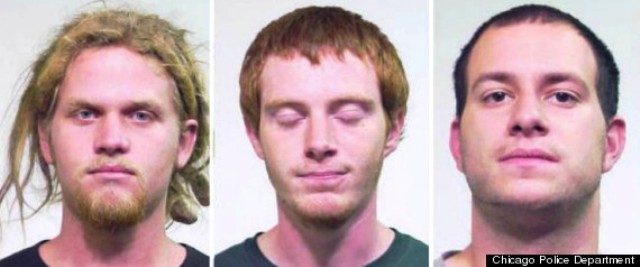Trial For The NATO 3 To Begin
By aaroncynic in News on Jan 6, 2014 10:20PM

Brent Betterly, Brian Church and Jared Chase have been charged in an alleged NATO summit terror plot. (Chicago Police Department booking photos.)
The trial begins this week for the “NATO 3,” a group of activists arrested prior to the NATO protests last year on alleged terrorism charges. The three men in their mid 20’s—Brian Church, Jared Chase, and Brent Betterly—were arrested in a police raid on a Bridgeport home last year just days before thousands took to the streets to protest the meeting of world leaders at McCormick Place. They face 11 counts, including two terrorism charges, which the Tribune reports could result in up to 40 years in prison. Each of the defendants has been in Cook County Jail for the past year on $1.5 million bond apiece.
The prosecution alleges the three men were planning to build Molotov cocktails to bring to the protests along with discussing “attacking” several locations, including President Barack Obama's re-election headquarters and police stations. Police also allege they found several weapons including knives and a throwing star, a mortar made from PVC pipe and a bow during the raid.
Much of the case against the three is based on information garnered from two Chicago Police informants who infiltrated local activist groups many weeks prior to the NATO protests. Known as “Moe” and “Gloves,” the prosecution alleges the two officers were inside the apartment where Church, Chase and Betterly were staying when they say they filled beer bottles with gasoline. One of the defendants allegedly asked “Gloves” if she was “ready to see a police officer on fire,” prosecutors allege.
Attorney’s for the defendants contend the police informants goaded the three men into much of the alleged discussions regarding the actions as well as the making of Molotov cocktails. Sarah Gelsomino, Church’s attorney, told the Sun Times “They [undercover officers] were more than just being there. They were in control.” According to court filings, Thomas Durkin and Joshua Herman, attorney’s for Jared Chase wrote:
“It takes little understanding to see ... how politically beneficial such an investigation and ... trial serve the purposes of the political elites whose judgment in the extraordinary use of public funds under the guise of ‘security’ might otherwise be questioned.”
Indeed, the case of the “NATO 3” follows a similar pattern of tactics law enforcement officials have used when pursuing activists, particularly prior to large scale protests that garner national attention. In 2008, two activists were arrested in a similar scenario involving Molotov cocktails prior to the Republican National Convention in Minnesota. As their trial played out, it was revealed the two young men were led nearly every step of the way by a paid FBI informant. In 2012, five men were arrested in Cleveland in connection with a plot to blow up a bridge just before scheduled protests were to occur on May Day. According to Alternet:
“It later emerged that a federal agent working undercover at Occupy Cleveland had encouraged violent escalation among young male activists, and even arranged for the purchase of the fake explosives the five activists allegedly attempted to detonate.”
As details for the case against the NATO 3 have emerged over the past year, activists and advocates have said situations like these are provoked by law enforcement. Last June, a spokesperson for the National Lawyer’s Guild, who have helped build the defense for the men, said:
“Given that no Molotov cocktails or other incendiary devices have been used at any political demonstration in the U.S. in recent memory, questions of whether law enforcement is in fact provoking or manufacturing criminal activity remain unanswered and extremely relevant.”